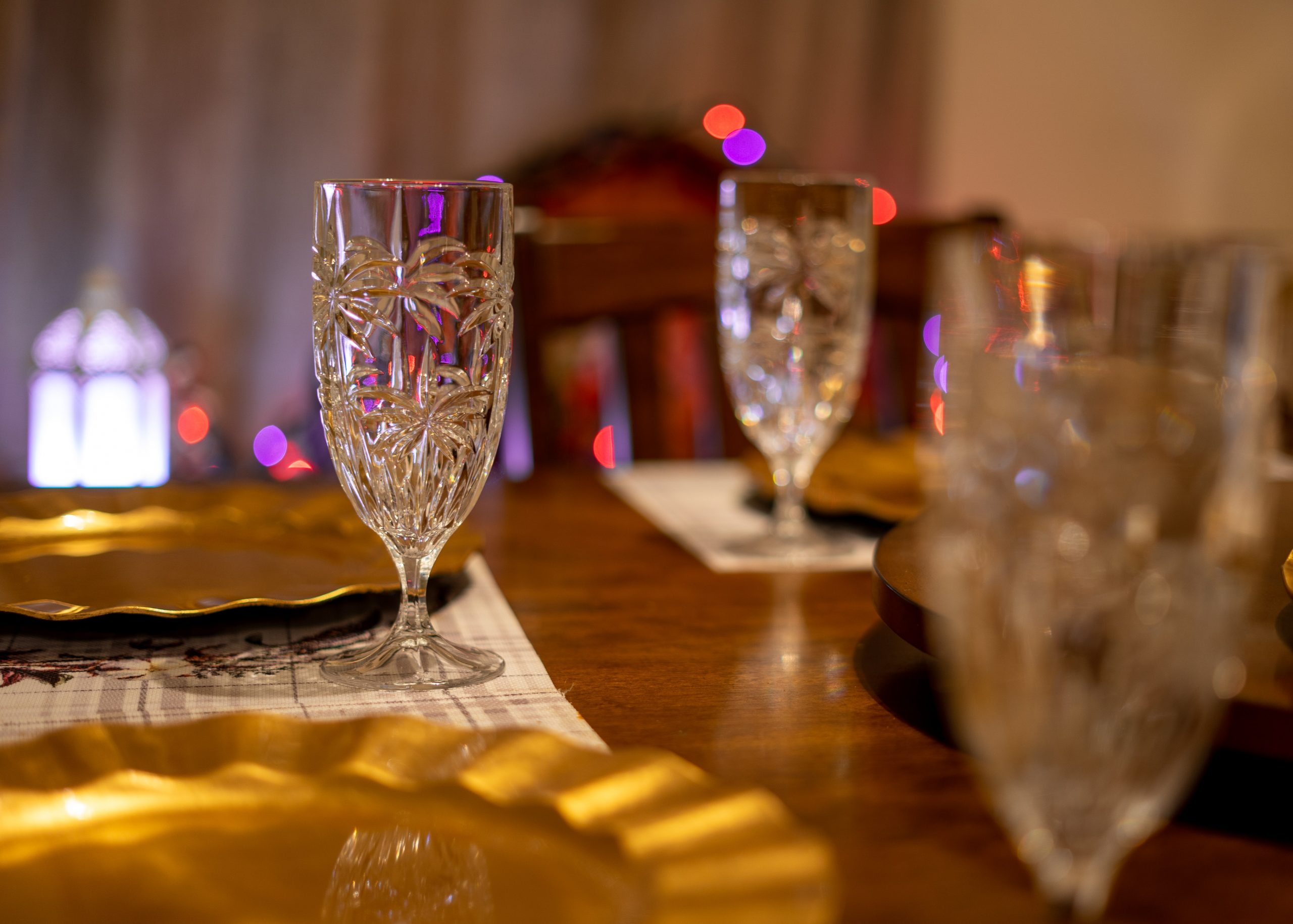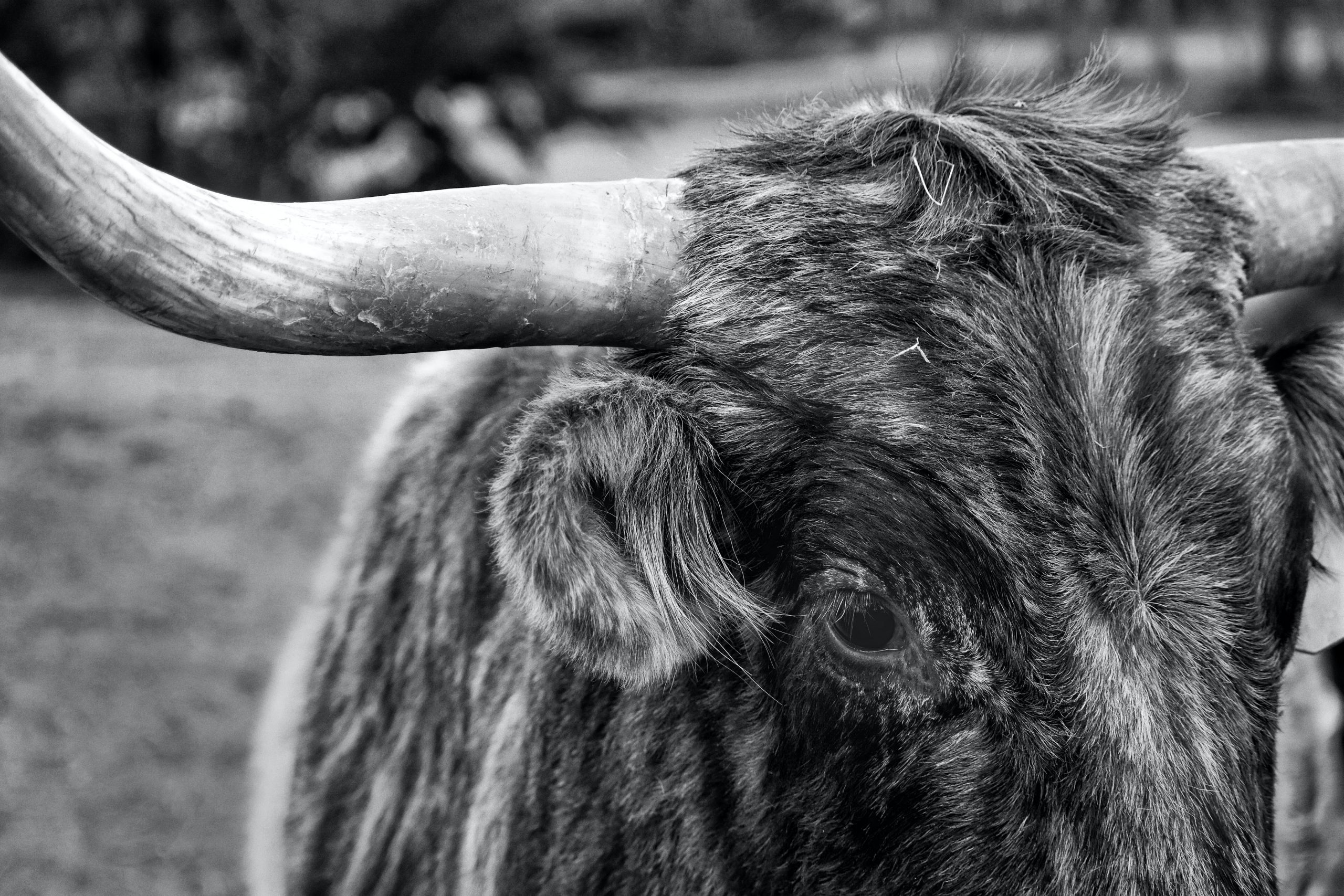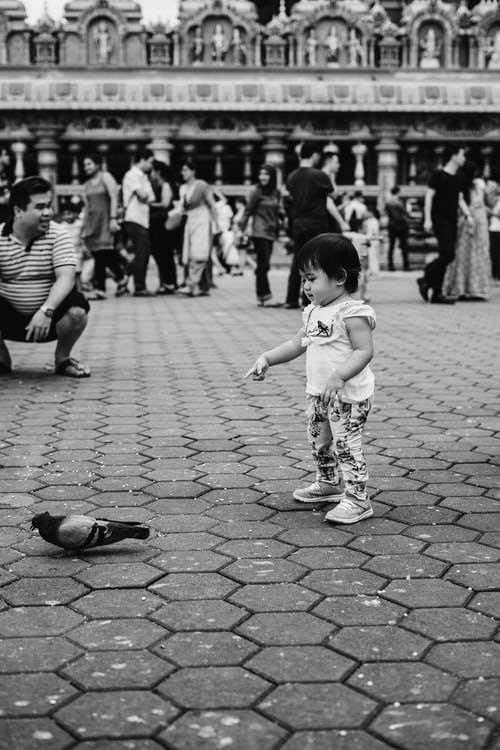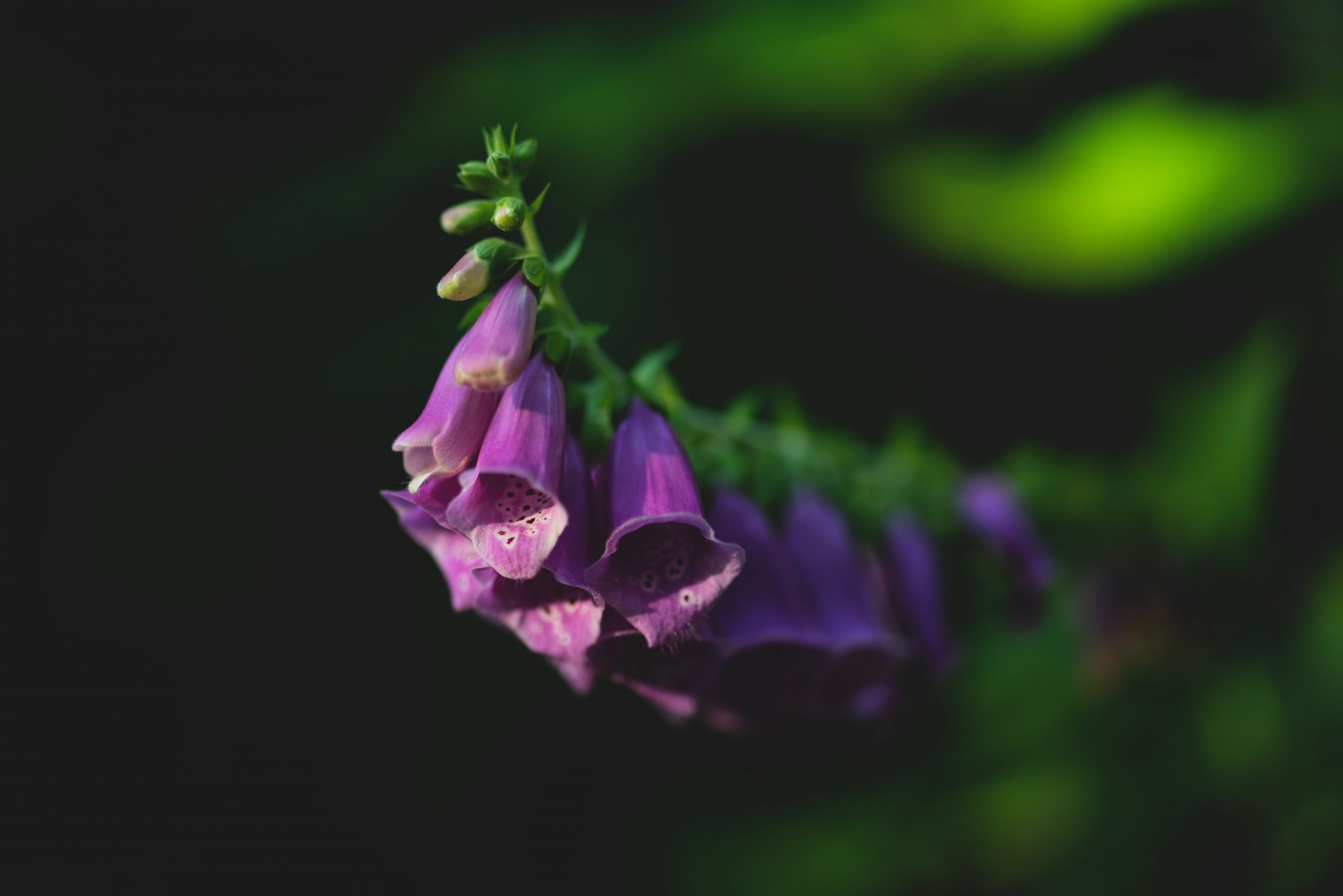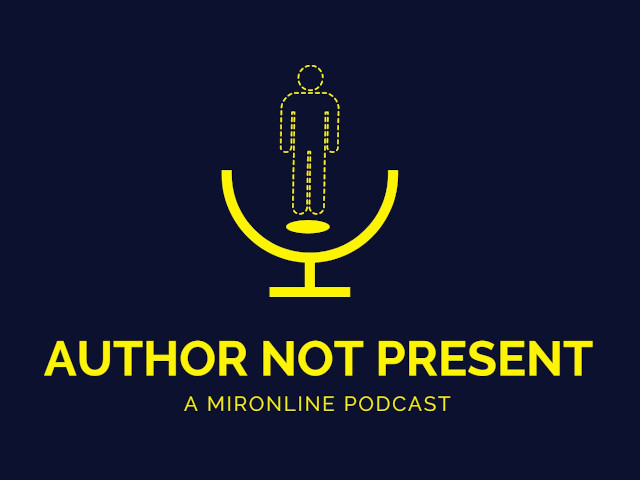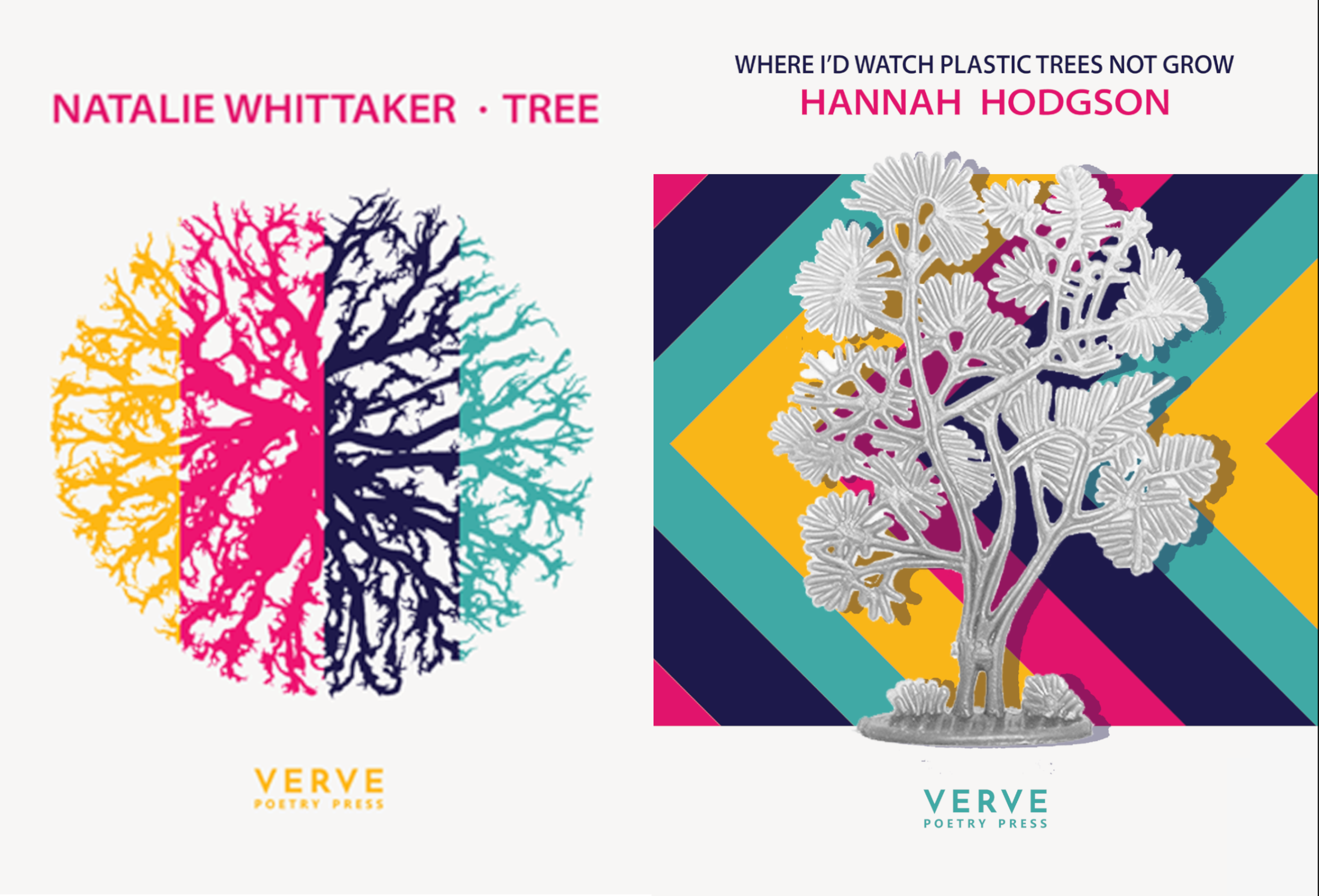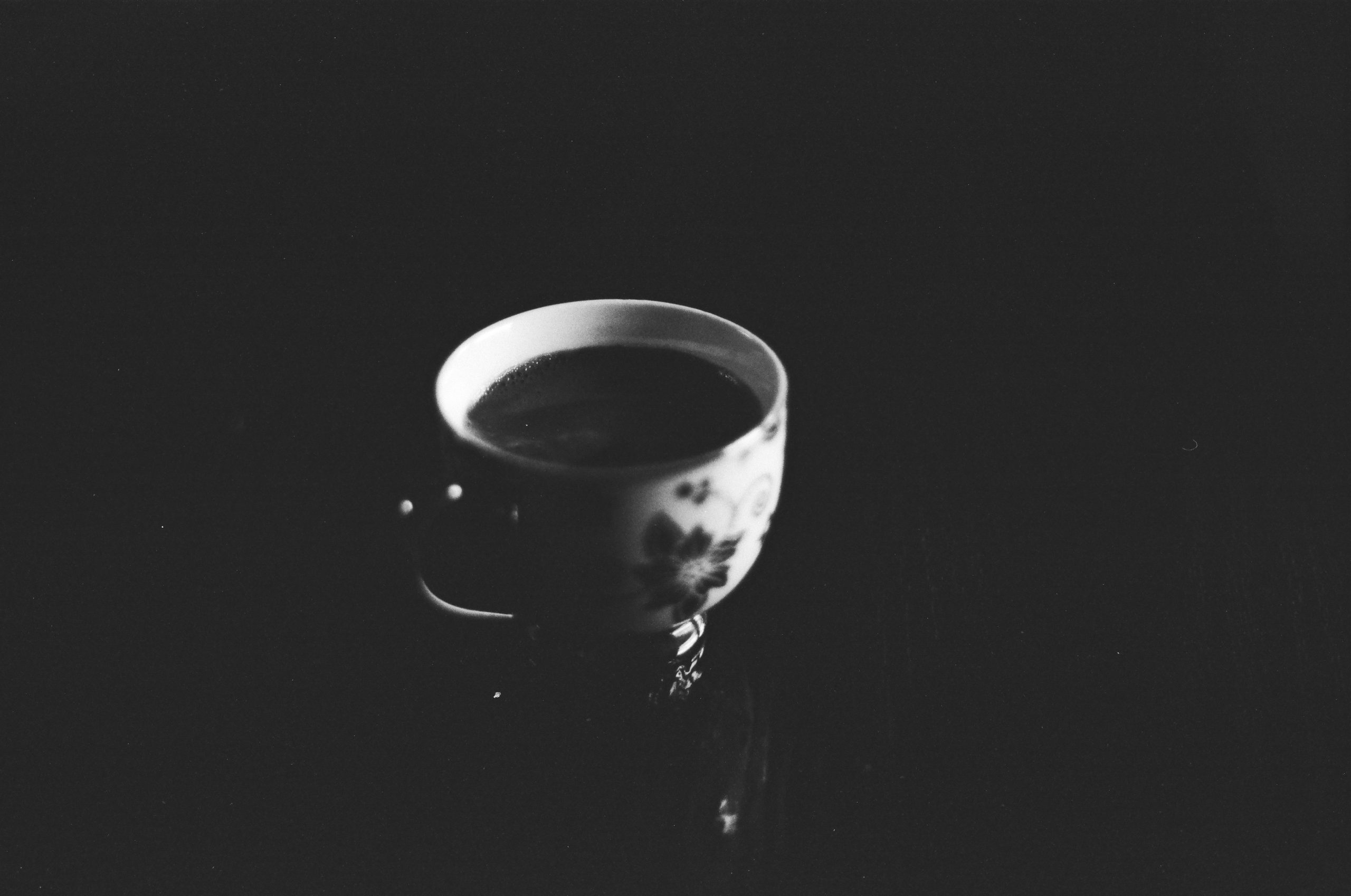Is drinking your first alcoholic drink in two years the traditional way to celebrate your daughter’s first birthday, I wondered. My parents were encouraging me to order from the wine list, so that they could too.
I looked up at the waitress, and shrugged, ‘An Aperol Spritz?’
She wrote down my order and looked to my husband, who was bouncing our daughter on his knee.
‘A lemonade, please, I’m driving,’ he said. ‘And can we get some milk for our daughter?’
The waitress pointed out the free drinks on the children’s menu and he said something self-deprecating. My parents ordered a white wine spritzer and a pint of bitter, as they always did. As if their drinks order would have anything to do with me.
‘Uh oh, nappy time,’ my husband said. I passed him the change bag. Better-natured than me, and less weary of baby admin, he accepted it and set off with her across the blond laminate. The floor was tutti-frutti with dropped breadsticks and colouring pencils — it was Saturday lunchtime, so child-free diners were in the minority. Our drinks arrived and I ordered his food for him. I was fed up with worrying about my postpartum figure, so, instead of a salade niçoise, I ordered a large pizza with arancini on the side.
‘So, Grandad’s all set to move in a few weeks,’ my mother said. She looked down at the table. ‘I’m meeting the auctioneer at his house on Tuesday, to see what they might be able to sell.’
‘Wow. It’s really happening,’ I said, pensively. ‘Don’t feel bad about it, Mum. It’s actually the kind thing to do. For you, as well.’
She shrugged and traced a knot in the table with her thumb.
I took a large slurp from my drink. The sugar content smacked me on the forehead. Had alcohol always been this sweet?
‘What’s happening to his books?’ I asked, and then cringed. Mum sighed. More gently, I elaborated, ‘There won’t be room for them in the nursing home, will there?’
‘No, no, the room is tiny. I suppose I’ll take them to the charity shop. Or, maybe your uncles will want some of them.’
Back came my husband, triumphant. Our daughter bobbed up-and-down on his shoulder, in time with the lollop of his feet. The way she gripped his shoulder told me that she was hungry.
Quickly, I said, ‘Could I have a look at the books before they go? I know it’s a pain, because we won’t be in Devon for a few weeks, but remember all those botanical compendiums that they had? Those ancient Encyclopaedia Britannica? I’d love those…’ I said, as I accepted my daughter back into my arms. She smelt better now. ‘I saved Adam’s life after reading those books, do you remember?’ I smiled at my husband, ready to recount the anecdote. Grandad’s books were key to the better version of the story. ‘Adam picked a foxglove one day, up on Dartmoor,’ I said, ‘when he was little. It was really bad.’
I left a gap for my parents to chip in.
‘Don’t you remember?’ I asked, looking at each of them in turn. Dad took a sip of his pint. Mum sighed.
Oh, it’s my imagination again. Right. I sat back in my chair.
Clearly, they’d hoped that motherhood had put an end to all that.
#
I had been playing shop when it happened. It was the summer of 1994 and heatwave-hot — hot enough for me to have eaten my breakfast out on our swing set that morning, dropping toast crumbs down the front of my sundress. Mum and her friend Maggie had obtained great bundles of sartorial overstock from somewhere, and they planned to sell it off in a shop space that they’d hired on a short-term lease. That day — a Saturday — was the day we would set up, ready for Monday’s grand opening. My diary entries for the preceding week were swaying fields of exclamation marks. I took the fact that they’d asked me to help them as proof of my burgeoning sophistication, which no-one else could see, because I was nine. My younger brother, Adam — childish, unsophisticated — had to stay home with Dad.
Ha.
We set off for the shop early, dew still twinkling on the lawn. My fairytale-loving heart exploded at the sight of the shop space: a rickety attic above a bike shop, spider and cobweb-sprinkled, and only accessible via a wrought-iron spiral staircase. Dust motes glittered in the air and I spun and spun with my arms stretched out. A haystack of bin bags towered over us, delivered the day before. I ran uphill to the tiny window and waved at the people in the tanning shop opposite. Here I am! I have a shop!
I’m the Tailor of Gloucester — come forth my little mice!
Or Mrs. Pratchett, in her glowing sweet shop. Though I won’t be poisoning anyone.
I curled my dirty fingers around a handful of imaginary sweets. I grimaced at my customers…
‘Sweetheart, stop that. You’re here to help,’ Mum snapped.
I pouted, chastened.
Fine.
All morning we worked to turn our witch’s tower into a viable shop. The blue zero on the till point glowed like a Catherine wheel. The telephone, with an old-fashioned dialling wheel, was plugged in, and actually worked. Polyester clothes tidal-waved across the floor, unstoppable. In my memory’s eye, all the clothes were paisley. Long skirts and blouses in whirling blues and greens, gauzy scarves with red pointillistic specks, swimsuits in fish-swim turquoise and orange. The swirling patterns seemed so hot to me, so romantic. The people who might buy these clothes, the sandy beaches they might be worn on, the perfume, the starlight, the suntanned skin…
‘Earth to Dolly Daydream…’ my mother sang.
I shook my head to snap out of it, desperate to be a credit to her. Should the racks be positioned here, or here, we deliberated, together. Should they be side by side, or against the walls? I placed my hands on my narrow hips, chewed my lower lip and contributed. They used one of my ideas and I nearly burst open. I began to sigh meaningfully, like my mother.
By midday, the room was sweltering. We ate cheese and pickle sandwiches by the bottle-glass windows. Outside, the bonnets of Rovers and Escorts bowed under the sun’s glare. I imagined my friends burning themselves on the metal clasps of their seatbelts. I sweated around my hairline and under my arms. We were making good progress: Maggie, my mother and I.
Our grand opening was assured.
After lunch, Mum and Maggie started clock-watching in the deliberate manner of women with young children. It prickled me: didn’t they want to stay and enjoy this special time, in this special place?
Did this all mean nothing to them?
‘Where have Steve and Adam gotten to?’ my Mum asked, urging my dad and brother to appear, so Dad could help with the heavy lifting.
I don’t care, I thought, slumping in the sharp corner with my lip out, my arms crossed. They will break the spell. I never want to leave.
I hope they never come.
Mum looked at me and sighed.
Bang, bang, bang — my father’s trainers on the rickety metal staircase. Tap, tap, tap came my brother’s feet, a little moorland pony trotting obediently behind. My father stopped at the top of the staircase to let my brother come in first.
And that’s when I saw the flower.
Long and pink, its little bells shaking — a foxglove in my brother’s hand. Panic burnt through me. I lurched forward, about to vomit. I knew all about foxgloves from Grandad’s books, from the stories.
‘You can’t bring a foxglove indoors,’ I screamed, ‘the fairies will murder us, they’ll be so angry!’
They looked at me.
‘The foxes will come for their gloves,’ I shouted, appealing to all of them in turn, ‘that’s a dead man’s finger, those are dead man’s bells! If they start ringing, Mum, we’re all dead, not just Adam. The witches—‘
But I got no further, as my mother laughed. She laughed at me. Looking me in the eye. Laughing.
My insides crumbled like a dry leaf. I ran towards Adam and lunged for the flower, keeping a sliver of space between the foxglove and my own precious skin. The physical suggestion moved no-one. They were bent over, full of mirth. I was frantic — these stories clouded the damp moorland air. My parents had given me a cloth-covered book of Dartmoor legends, just a year or two before. The tors really did look like witches—
Adam started to swish the flower through the air, like a sword.
Danger bit at the back of my throat — I shouted again, ‘It’s poisonous, he needs to throw it away!’
In my mind he fell dead to the floor. My breath was racing, as if I was the one who’d been poisoned: I’m asthmatic, but didn’t know it then. Mum grabbed me by the shoulders and ordered me to calm down. She smeared my fringe off my face and used nearby garments to blot my tears. Still, my brother held on tight to the foxglove. He was sobbing into Dad’s shorts, frightened by me and my histrionics.
Through my panic came a thought. No-one could ignore an expert. I pictured the foxglove page in Grandad’s book: pink, flicked-edge bells, arching green stem. Beneath it was its scientific name: digitalis purpurea.
I squeaked one word out: digitalis.
This was an adult word, carved from Latin, so I was aware of its power. And the power of me uttering it. Stupid girls didn’t know words like that, just like stupid girls weren’t suddenly hysterical for no reason. It was the name of a drug. A genus. I felt the weight of responsibility lift off my shoulders. The carpet came back into focus. Once I had defined the problem in adult terms, I felt sure that they would act.
#
Had the foxgloves rung for me and my daughter, just a year before?
The view from the hospital’s fifth-floor had been all sixties’ flat rooftops and bandage-white sky. Not a foxglove in sight. Devon folklore still clung to me, though I’d moved away.
We stayed in hospital for two days after her birth: a catastrophic reaction to the epidural had killed us both, briefly, and then they’d whipped her out of me with a knife. Nine hours after being sliced halfway through, I was back up on my feet, smearing tar-black meconium up my arms as I struggled to change my first nappy. The woman in the curtained bay next-door spoke on her phone all night, complaining about her boyfriend, who hadn’t been in to see her, or their baby. I was shaking and my breath was coming fast. Just call him then! I screamed at her, without words. Everyone around us was crying. Every time I picked up my daughter, I soaked her in sweat. Every time I tried to feed her, she screamed in horror at my breast.
Keep her at the nipple, the midwives chanted, as they hurried from bed to bed, folding blankets. She will latch when she’s ready. Had my milk even come in? They gave us a private room to reduce the noise on the ward. Night became day became night. Forty-eight hours’ of feeding attempts later and I could barely focus on the red-haired midwife who watched us through the door’s glass panel, and then came in to suggest that we were ready for discharge. I looked at her. Her skin was back-lit by blankness. A subtle black shape swooshed by.
‘I don’t think we can go home, she’s not feeding,’ I said, amazed that I could still make sounds. She put her cold hands on my breast and squeezed. Gold-top dotted on my nipple.
‘Well, your milk is in,’ she said, Irish. ‘Let’s see your latch.’
I held my daughter horizontally across my ribcage and did an impression of mothers I’d seen breastfeeding their babies. My daughter took my nipple for two seconds, maybe three. Enough to lick the drop away.
‘She’ll feed when she’s hungry,’ the midwife said, already back on her feet. ‘I’ll go and do your paperwork.’
Somehow, my daughter’s reticence to feed became normal. She’d recently died, I reasoned — who could blame her for not being hungry? We drove home with her, through the December night.
Something black followed me into the house. Malevolence pulsated up the stairs. A creature, perhaps — I glimpsed it as I changed her, as I rocked her, as I offered my breasts again and again and was answered with apoplexy. She gripped me like a goblin, scratching at my neck. On the fourth day, we called a lactation consultant, who advised me to hand express, and to keep trying — we were only one feed away from success! She made me promise to repeat breast is best to myself in the dark moments, and I did it. Remember, breastmilk is what is best for your baby, she’d said to me. Without it, how do you expect to bond?
On the fifth day, the midwife visiting my home discovered that my daughter had lost sixteen percent of her body weight since birth. Up to ten percent is acceptable. Flustered, she gave me a print-out about breast pumps and suggested I visit the children’s centre. How can I get there, I wondered, as she picked up her leather bag and left for her next appointment. I just had a caesarean section — I can’t drive for six weeks? I hand-expressed fifteen millilitres that day, and fed it to my daughter with a Calpol syringe. She drank it and I was proud of myself for fixing the problem. (Newborn babies need one hundred and fifty millilitres per kilo of weight, per day, to survive. She was over three kilos then, just about. I learned this ratio months later.) Giddy with fear, I told my husband about the dark shadows that swooshed around the eaves of the house, the eyes that could see me, always. I might even have laughed about it.
‘Are you okay?’ my husband asked. He frowned, jittery. ‘Maybe tonight we’ll get some sleep…’
On day six, she was eighteen percent down on her birth weight. She was dying, again. Had I noticed the cessation of her scant cries? Had I? The skin on my face was a mask. We were admitted to the sixth floor of the hospital, this time. Exactly one floor up. Now, the black shapes were witches, clear-edged, crashing into me as I released her to the hospital, as they turned my limp and sunken girl into a crisis, into jagged spikes on a chart. I waited in a side room as the witches crushed me, blackening my eyes—
It was Aptamil that brought her back.
After the worst was over, the doctor sat down on the end of my bed. I’d pulled the blinds across the single-glazed window, so he and my daughter — sleeping now — were striped in lines of morning light.
‘So, Mrs. Wheble, what do you think happened?’ he asked, the non-judgemental face of public health.
How far back should I go, I wondered. Back to our deaths, the week before?
To the black shapes that screamed at me not to leave the hospital with her?
To the stiff hunger of my daughter’s hands?
To the witches?
The foxglove?
The consultant waited, folding over the end of his silver tie. I noticed a faint paisley pattern on it. He wasn’t going to get me like this — I was old enough to know by then that people didn’t like it when I said things, without reason.
Folklore is never the answer you give.
Into the silence, he said some words of science.
Flushed with relief, I answered in kind.
We spoke of tongue ties, of the shock of traumatic birth on the body, of the drugs that were administered to us both, and might still reside in her, making it difficult for her to feed. Egged on by his approval, I went further, speaking of sleep deprivation, flattened nipples, until I was, without forethought, spitting expletives of science, words that a nice girl like me shouldn’t even have known: exclusive formula feeding
microwave steam steriliser
fast flow teats.
Thrilled by these words, he patted my hand and went off and ticked a form somewhere.
When my daughter was back up to a healthy weight, we went home.
#
My mother didn’t remember that day in the shop. She had no memory, she said, of the bags of clothing, or my hysteria, or my brother casually wandering about, clutching a poisonous flower. There was no way, she said, taking a sip of her white wine spritzer, that she and my father would need their nine-year-old daughter to tell them about Dartmoor’s toxic flowers, having lived two minutes away from it their whole lives.
As if she’d let her son keep hold of a freshly picked foxglove.
I, in turn, took a sip of my Aperol Spritz.
I could sense my mother thinking, fanciful child. And, is this still entertaining, at thirty-two?
But with a little probing, she did recall the bin bags of clothing and those rickety metal stairs.
Although we weren’t selling the clothes for our own benefit, or for profit, she said. And you weren’t nine.
My daughter’s picture book clattered to the floor and I bent down to pick it up.
A second-hand clothes store in Tavistock had gone into liquidation, she said, and she had persuaded the proprietor to let her sell the bankrupt stock and keep the profit for the local playgroup. For playgroup to still have been a relevant concern, she said, my little brother would have been, at the oldest, three years old, making me a maximum of six. If I had been nine, playgroup would have been nothing more than a memory.
Our food arrived at the table, steaming.
I used a slicer wheel to cut up my pizza as she talked.
They had used the room above the cycle shop to sell this bankrupt stock — she tilted her head to the side, with a long ‘oh yeah’ at the memory — and the summer had indeed been scorching. She’d enjoyed the experience so much that she and Maggie had enquired about taking on the permanent lease of the shop. But our children were too small at the time, my mother said, matter-of-factly, perhaps forgetting that one of the small children was me.
‘Do you remember laughing at me?’ I asked, tender.
‘Why would I laugh at you?’ she laughed. ‘I mean. Maybe you over-reacted, but you’ve always been a clever girl,’ she sighed. ‘All that reading.’
I asked more questions, trying to pin down the details.
She answered, variously, ‘Yes, we had an electronic till, a great clunking thing that rammed your hip if you stood too close. Why would they all be paisley? There is no way,’ she said, elongating the words for emphasis, ‘that your father would let your brother pick a foxglove. That part is ridiculous. We would never have let that happen,’ she said.
My Dad, eating quietly, shifted in his seat. For a while, we were all occupied by our food.
Despite my mother’s focus on the implausibility of the foxglove, I wondered if it was my position in the narrative that made her reject it. I looked at my daughter, who was merrily stuffing penne bolognese into her cherub mouth. Was this foxglove story a comfort to me, because I saved a child once? Parenthood had paired the angels with the witches, after all. Bright day with dark night. Perhaps I’d needed a spell, since then, to ward off the evil that I could always see, lurking out of the corner of my eye. A charm to keep the despair at bay. I knew that bad things could happen, and do.
In the absence of any religion, perhaps my foxglove story was it.
I pushed on with my questions, but my mother had had enough. She regarded me with good-natured side-eye. She was humouring me. Further probing exasperated her.
Come on, Lyndsay, is one of the things that she didn’t say.
Others included, are you trying to make your father and me sound negligent?
And also, you do like to write stories about your life.
#
Our empty plates were taken away. My daughter was getting fractious. Nap time was looming and we’d be foolish to delay. We worked together to facilitate the end of our meal: someone paid the bill, someone else tidied the table, the person with the short straw changed her nappy, again, and then we all checked under the table to be sure that nothing had been left behind. Clipped into her pram seat, she was instantly asleep. As we filed out of the restaurant, Dad said that as a child, he and his four siblings used to pick foxgloves all the time. They were allowed to bring them home and have them in their rooms because his parents — my grandparents — trusted that they knew not to eat them. They’d grown up on the moor, so they knew what was dangerous, he said. So, yes, he would have allowed my brother to pick a foxglove.
Why not?
He’s not stupid. He wouldn’t have eaten it.
My mother choked on her takeaway coffee. She glared at my shoulder bag, which contained my notebook, my pencil and their freely-given words; I thought about it too often not to write about it. The hair on the back of my neck stood up. The words woke up on the page.
My Dad, a quiet man, kept talking:
‘My Mum always said that old wive’s tales kept on because they had truth in them. We used to make fun of the way she spoke, but she kept us all going, didn’t she? She could talk about things that had no reason — things that were difficult to say.’
I looked at my Dad. Mum shook her head with derision. My husband fiddled with the straps of the change bag. I burst into childish tears.
Lyndsay Wheble’s work has appeared in Litro, Belle Ombre, NEWMAG, Queen Mob’s Teahouse, The Oxford Writing Circle Anthology and elsewhere. She won the Reflex Fiction Prize Summer 2018 and has shortlisted for the HISSAC and Yeovil Prizes. She has an MA in Creative Writing from Oxford Brookes.


